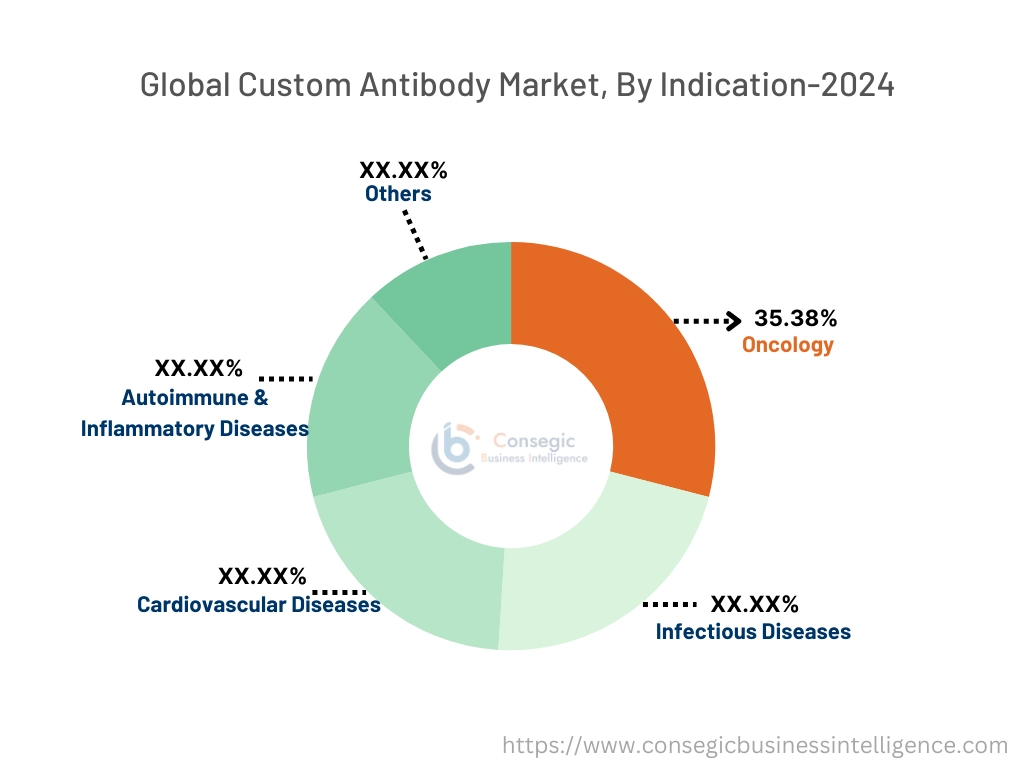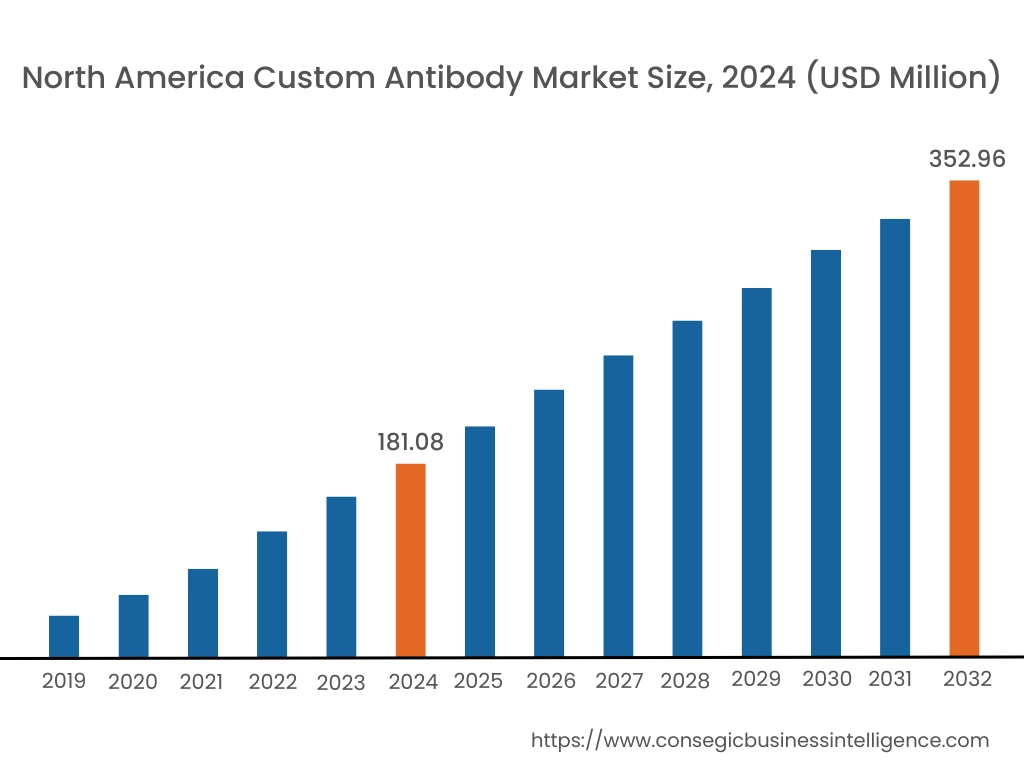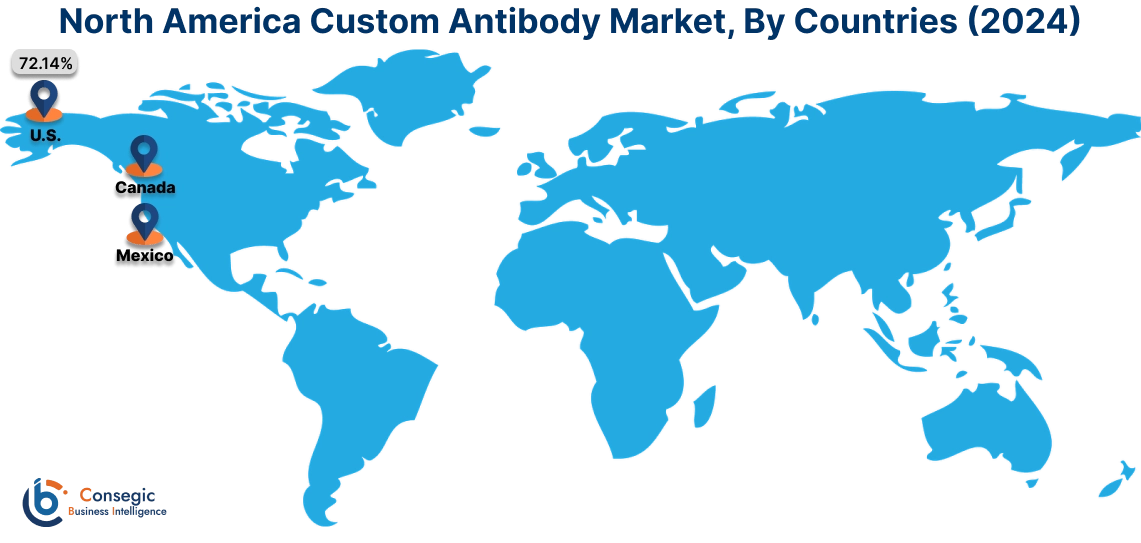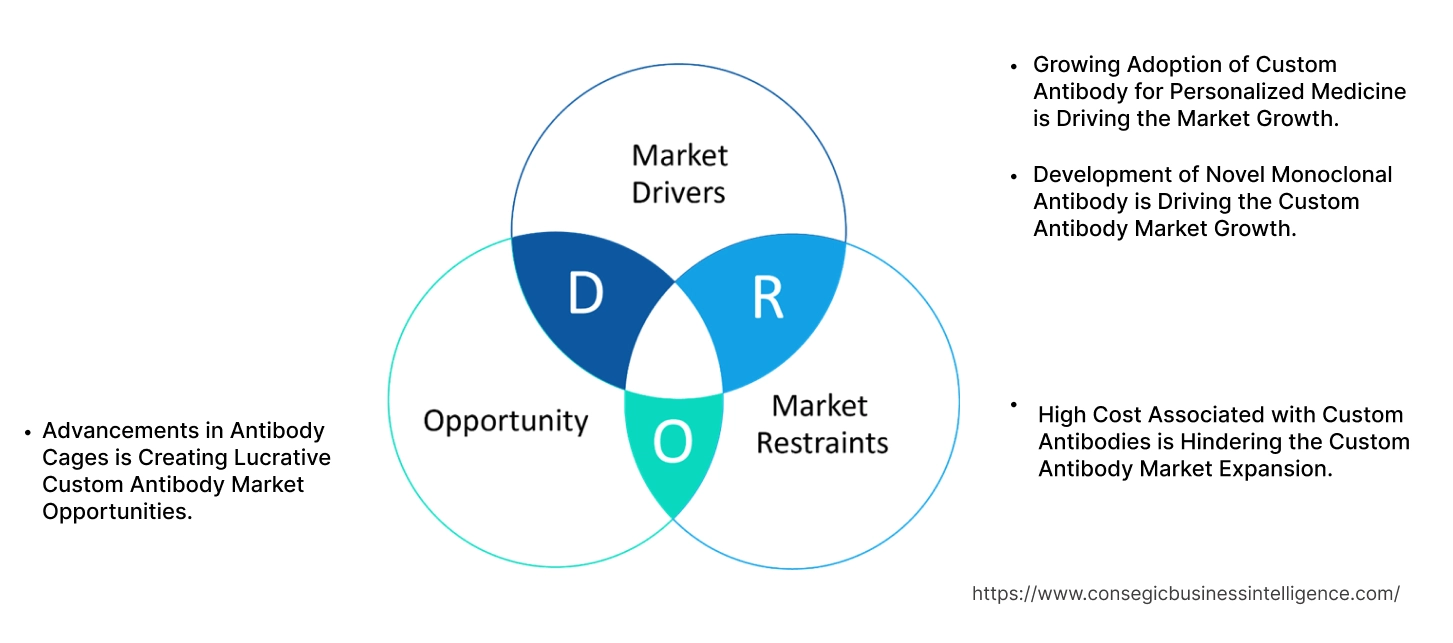Custom Antibody Market Size:
Custom Antibody Market size is growing with a CAGR of 9.3% during the forecast period (2025-2032), and the market is projected to be valued at USD 845.83 Million by 2032 from USD 415.70 Million in 2024.
Custom Antibody Market Scope & Overview:
Antibodies are Y-shaped proteins produced by the immune system to identify and neutralize foreign substances, such as bacteria, viruses, and toxins. These antigens are recognized as antigens by the immune system. Custom antibodies are specifically designed and generated to target a particular protein or molecule of interest, offering researchers a powerful tool for a wide range of applications. Unlike commercially available antibodies, which have limited specificity or are suitable for a particular research need, custom antibodies are tailored to the unique requirements of the investigator. This tailored approach ensures high specificity, sensitivity, and reliability in research experiments, enabling scientists to gain deeper insights into biological processes and disease mechanisms.
The type of custom antibodies consists of monoclonal antibody, polyclonal antibody, and recombinant antibody. The indication includes oncology, infectious diseases, cardiovascular diseases, autoimmune & inflammatory diseases, and others. End users of these custom antibodies include pharmaceutical and biotechnology companies, academic and research institutes, contract research organizations, diagnostic laboratories, and others.
How is AI Impacting the Custom Antibody Market?
AI is significantly impacting the custom antibody market by accelerating discovery, optimizing design, and streamlining production processes. AI algorithms can analyze vast datasets to predict antibody behavior, optimize binding affinity, and reduce development time. Also, AI algorithms analyze vast datasets of protein structures, sequences, and binding affinities to predict antibody-antigen interactions, enabling researchers to identify promising candidates more efficiently. Thus, the AI integration leads to more efficient identification of antibody candidates, customized solutions, and ultimately, faster development of effective therapies and diagnostics.
Custom Antibody Market Dynamics - (DRO) :
Key Drivers:
Growing Adoption of Custom Antibody for Personalized Medicine is Driving the Market Growth.
The escalating adoption of custom antibodies within the developing field of personalized medicine is a key driver of market growth. Personalized medicine, with its focus on tailoring treatments to individual patient characteristics, necessitates highly specific and sensitive tools. These antibodies, designed to target unique molecular markers within a patient's disease, play a crucial role in this paradigm. They enable precise diagnosis, facilitate the development of targeted therapies, and allow for the monitoring of treatment response at an individual level.
- A recent report by the Personalized Medicine Coalition, in 2023, states that 16 new personalized treatments were approved for patients with rare diseases in 2023, a significant increase from the six approvals in 2022. Among the 2023 approvals, seven were cancer drugs, while the remaining three targeted other diseases and conditions. This highlight increasing reliance on personalized medicine, which often involves the use of custom antibodies for precise diagnosis, targeted therapies, and personalized treatment monitoring.
Thus, the growing reliance on custom antibodies for advancing personalized medicine is expected to significantly fuel custom antibody market growth.
Development of Novel Monoclonal Antibody is Driving the Custom Antibody Market Growth.
The development of novel monoclonal antibodies is a significant driver for the development within the market. Monoclonal antibodies, with their exceptional specificity and ability to target specific molecules, have developed various fields, including diagnostics, therapeutics, and research. Advancements in antibody engineering technologies have enabled the creation of novel monoclonal antibodies with enhanced properties, such as increased affinity, improved stability, and reduced immunogenicity. These novel antibodies are increasingly used for a wide range of applications, including the development of targeted therapies for cancer and other diseases, the development of novel diagnostic tools, and the advancement of basic research. Manufacturers are developing novel monoclonal antibodies that are sourced from rabbits for various applications
- In October 2022, Biosynth expanded its custom antibody offerings with the launch of a new service for the development of rabbit monoclonal antibodies. This new service leverages Biosynth's proprietary single B-cell screening technique, enabling the generation of high-quality rabbit monoclonal antibodies with enhanced specificity and affinity. This expansion further strengthens Biosynth's position as a leading provider of custom antibody solutions, offering researchers and developers access to a wider range of antibody technologies and capabilities.
Overall, his continuous innovation in monoclonal antibody development is a key factor driving the custom antibody market expansion.
Key Restraints:
High Cost Associated with Custom Antibodies is Hindering the Custom Antibody Market Expansion.
One of the primary factors hindering the development of the market is the high cost associated with their development and production. The process of generating custom antibodies involves several intricate steps, including immunization, hybridoma generation, antibody screening, and purification, each requiring significant time, resources, and expertise.
These high costs cause a significant barrier for researchers, particularly those with limited budgets, such as academic institutions and smaller research laboratories. The high costs not only restrict access to these specialized reagents but also stifle innovation and research advancement in various scientific fields that depend on custom antibody applications. Overall, these financial constraints limit the accessibility of custom antibodies and hinder research progress in various fields.
Future Opportunities :
Advancements in Antibody Cages is Creating Lucrative Custom Antibody Market Opportunities.
Advancements in antibody cage (AbC) technology are creating new opportunities within the market. As researchers gain a deeper understanding of AbC assembly and functionality, the potential for integrating custom antibodies into these unique structures is becoming increasingly apparent. By incorporating custom antibodies, specifically designed to target particular antigens or disease markers, into AbC architectures, researchers potentially develop novel therapeutics with enhanced efficacy and specificity. This includes applications such as targeted drug delivery, improved immune cell engagement, and the development of more potent cancer therapies. Novel AbCs are being developed using artificial intelligence.
- In October 2024, Archon Biosciences, launched a new initiative aimed at creating novel antibody cages (AbCs). This project uses novel protein engineering techniques to assemble multiple antibodies into precisely defined, cage-like structures. By incorporating custom antibodies into these AbC architectures, the company developed a new class of therapeutics with enhanced potency, specificity, and novel mechanisms of action.
Overall, as these technologies continue to evolve, the requirement for custom antibodies tailored for integration into AbCs is likely to increase significantly, creating lucrative custom antibody market opportunities for companies in the coming years.
Custom Antibody Market Segmental Analysis :
By Type:
Based on type, the market is categorized into monoclonal antibody, polyclonal antibody, recombinant antibody, and others.
Trends in the Type:
- The growing trend for monoclonal antibody for application in therapeutic, diagnostic and research is influencing the segment.
- The development of recombinant antibody because of its advantages such as reduced batch variability is enhancing the segment.
The monoclonal antibody segment accounted for the largest custom antibody market share in 2024.
- Monoclonal antibodies are a crucial type of custom antibody, characterized by their exceptional specificity and homogeneity.
- They are generated from a single clone of a B-lymphocyte, resulting in a highly uniform population of antibodies that recognize a single specific epitope (the specific region on an antigen that the antibody binds to).
- A custom monoclonal antibody is a highly specific antibody produced through a specialized process to target a unique and often novel antigen.
- This high specificity makes them invaluable tools in various research and therapeutic applications, including cancer treatment, autoimmune disease management, and diagnostic imaging.
- Novel production services are being introduced for the development of monoclonal antibodies.
- For instance, in March 2021, Giotto Biotech expanded its service offerings with the launch of a new, highly specialized service for the production of monoclonal antibodies. This development signifies Giotto Biotech's commitment to providing comprehensive and novel antibodies that are custom made for researchers and the biotechnology industry.
- Overall, monoclonal antibodies, particularly custom monoclonal antibodies, are indispensable tools in modern biomedical research and therapeutics. Their exceptional specificity and homogeneity, derived from a single B-lymphocyte clone, make them useful for diverse applications ranging from cancer treatment and autoimmune disease management to diagnostic imaging.
The recombinant antibody segment is expected to grow at the fastest CAGR over the forecast period.
- Recombinant antibodies represent a powerful type of custom antibody generated through in vitro techniques.
- Unlike traditional monoclonal antibodies that rely on hybridoma technology, recombinant antibodies are produced by cloning the genes encoding the antibody heavy and light chains into expression vectors.
- These vectors are then introduced into host cells, such as bacteria or mammalian cells, which then produce the desired antibody proteins.
- This approach offers several advantages, including the ability to engineer and modify antibody properties, such as affinity, specificity, and stability, with greater precision.
- Recombinant antibodies have become increasingly important in research and therapeutic applications, enabling the development of novel treatments for a wide range of diseases.
- Thus, these aforementioned factors are influencing the custom antibody market trends in the coming years.
By Indication:
Based on the indication, the market is categorized into oncology, infectious diseases, cardiovascular diseases, autoimmune & inflammatory diseases, and others.
Trends in Indication:
- The increasing use of antibodies for neurodegenerative degenerative disorder and infectious disease is influencing the segment.
- The rising trend of antibodies for cancer treatment is driving the segment.
The oncology segment accounted for the largest market share of 35.38% in the year 2024.
- Oncology represents a significant driving force in the demand for custom antibodies.
- Within cancer research and therapy, custom antibodies play crucial roles, including targeting cancer cells directly with monoclonal antibodies to inhibit proliferation, delivering cytotoxic drugs specifically to cancer cells through antibody-drug conjugates (ADCs), harnessing the body's immune system to fight cancer through immunotherapy approaches like checkpoint inhibitors and CAR T-cell therapy, and facilitating cancer diagnosis and prognosis through the development of diagnostic tools like immunohistochemistry and ELISA, as well as the identification of predictive biomarkers.
- The continuous advancements in cancer research, coupled with the growing emphasis on personalized medicine, are driving a substantial and sustained requirement for innovative and highly specific custom antibodies within the oncology field.
- Various government bodies are partnering with manufacturers for the development of custom antibodies for cancer applications
- For instance, in 2021, Abcam entered into a partnership with Cancer Research UK to collaborate on the development and commercialization of novel custom antibodies. This strategic alliance aims to accelerate cancer research by providing researchers with access to high-quality, cutting-edge antibody reagents.
- Thus, these factors are influencing the custom antibody market demand in the coming years.
The autoimmune & inflammatory diseases segment is expected to grow at the fastest CAGR over the forecast period.
- Custom antibodies play a critical role in the investigation and management of autoimmune and inflammatory diseases, conditions characterized by the immune system mistakenly attacking the body's own tissues.
- These antibodies serve multiple functions, including elucidating disease mechanisms by targeting specific autoantibodies or immune complexes, developing novel therapies through strategies such as neutralizing pathogenic autoantibodies, modulating immune responses, and delivering therapeutic payloads to inflamed tissues, and facilitating diagnosis and monitoring through the development of sensitive and specific diagnostic tests.
- The increasing prevalence of these diseases, coupled with a deeper understanding of their complex pathophysiology, is driving a significant demand for innovative custom antibody-based therapies and diagnostic tools.

By End-User:
Based on end user, the market is categorized into pharmaceutical and biotechnology companies, academic and research institutes, contract research organizations, diagnostic laboratories, and others.
Trends in the End User:
- The growing trend of government and public funding for antibody development in research institutes is propelling the segment
- Adoption of these antibodies in diagnostic laboratories is influencing the segment.
The pharmaceutical and biotechnology companies segment accounted for the largest market share in the year 2024.
- Pharmaceutical and biotechnology companies are major consumers of custom antibodies, significantly driving market demand. These companies utilize custom antibodies across various facets of their operations, including drug discovery and development such as the development of novel therapeutics like monoclonal antibodies for cancer treatment, antibody-drug conjugates, and immunotherapies.
- In biologics manufacturing, where custom antibodies are utilized for process development and quality control to ensure product purity and consistency, diagnostic development encompassing the development of novel diagnostic assays, including enzyme linked immunosorbent assay, lateral flow assays, and immunohistochemistry.
- For disease detection and diagnosis, and internal research and development programs where custom antibodies are extensively used to investigate disease mechanisms, identify novel drug targets, and conduct preclinical studies.
- The strong demand for innovative therapeutics and diagnostics within these sectors serves as a crucial driving force for the market.
- The rise in the development of new biotechnology companies enhances the use of these antibodies for various research and development applications.
- For instance, according to the data published by IBEF, states that the surge in biotechnology startups in India, with approximately 1,128 new entrants in 2021 alone, has created a dynamic environment for innovation. This development further accelerates the development and application of antibodies that are custom made.
- Thus, as per the market analysis, these aforementioned factors are enhancing the use of these antibodies in pharma and biotechnology companies.
The contract research organization segment is expected to grow at the fastest CAGR over the forecast period.
- Contract research organizations (CROs) represent a significant end-user segment within the market. CROs, by their nature, provide research and development services to pharmaceutical companies, academic institutions, and other entities.
- In this context, CROs utilize custom antibodies extensively for various purposes.
- CROs leverage custom antibodies in preclinical studies, such as target validation, biomarker identification, and the evaluation of potential drug candidates.
- Custom antibodies are instrumental in various aspects of clinical trials, including patient sample analysis, biomarker monitoring, and assessing treatment efficacy.
- CROs utilize custom antibodies to assist academic researchers and other clients in conducting a wide range of research studies, from basic scientific investigations to applied research projects.
- Thus, based on the market analysis, these aforementioned factors are driving the development of the segment.
Regional Analysis:
The regional segment includes North America, Europe, Asia Pacific, the Middle East and Africa, and Latin America.

In 2024, North America accounted for the highest market share at 43.56% and was valued at USD 181.08 Million and is expected to reach USD 352.96 Million in 2032. In North America, U.S. accounted for the highest market share of 72.14% during the base year of 2024.
North America dominates the global custom antibody market, driven by factors such as significant government funding for research and development, a strong presence of leading pharmaceutical and biotechnology companies, and a well-established infrastructure for research and development. The region boasts a high concentration of renowned academic institutions and research centers, fostering a dynamic environment for antibody research and development. Novel manufacturing sites are being introduced in the region for the development of novel antibody.
- In October 2023, Sino Biological announced the opening of its new US-based Center for Bioprocessing (C4B) in Houston, Texas. This development signifies a crucial step for the company, enhancing its ability to serve the North American market with expedited access to high-quality bioprocessing services. The C4B will specialize in the development and production of recombinant proteins and antibodies, including custom antibody development, utilizing cutting-edge technologies and a highly skilled team.
Furthermore, the presence of a robust regulatory framework and a strong emphasis on innovation within the healthcare industry contribute to the significant development of the market in North America.

Asia Pacific is experiencing the fastest growth with a CAGR of 10.6% over the forecast period. The Custom Antibody market trend across the region is attributed to factors such as the presence of major manufacturers and a strong emphasis on personalized medicine. Rapid economic development across many countries in the region has led to a burgeoning middle class with increased disposable incomes, enabling them to afford healthcare and invest in research and development. Rising awareness among the population regarding critical illnesses and their significant financial impact is fueling demand for such insurance. Furthermore, the region's rapidly aging population is experiencing a higher incidence of chronic diseases, increasing the likelihood of critical illnesses and the need for financial protection. Finally, government initiatives in many countries are actively promoting the importance of health insurance and encouraging the development of the insurance sector, further stimulating the market.
Europe presents a significant contribution to the Custom Antibody market analysis. The European market is a significant contributor to the global landscape, characterized by a strong presence of research institutions, pharmaceutical companies, and biotechnology firms. Key factors driving market development include a robust emphasis on scientific research and development within the region, coupled with substantial government funding for research initiatives. Europe boasts a thriving ecosystem of academic institutions and research centers, fostering a dynamic environment for antibody research and development. Additionally, the European market is characterized by stringent regulatory frameworks that prioritize quality, safety, and efficacy, ensuring high standards for custom antibody development and production. Based on the market analysis, this combination of factors positions the European market as a key player in the global custom antibody landscape, with significant potential for continued innovation.
The Middle East and Africa (MEA) region is witnessing notable Custom Antibody market demand characterized by significant potential. The Middle East and Africa regions present a developing market for custom antibodies. While currently smaller compared to mature markets like North America and Europe, it exhibits significant potential. Factors like increasing healthcare expenditure, rising prevalence of chronic diseases, and growing investments in research and development are driving market growth. Based on custom antibody market analysis, government initiatives to improve healthcare access, growing private sector investments in healthcare, and increasing collaborations with international research institutions are creating trends for the market to expand.
Latin America is an emerging region in the Custom Antibody market share, with significant potential for innovation. The Latin American market for custom antibodies is an emerging market with significant growth potential. While currently smaller compared to developed regions, factors like increasing investments in research and development within Latin American countries, growing collaborations between academic institutions and industry, and a rising focus on addressing regional health challenges are driving market. Key growth drivers include a growing emphasis on infectious disease research, particularly related to neglected tropical diseases prevalent in the region, and an increasing focus on developing personalized medicine approaches for conditions like cancer and autoimmune disorders. Additionally, increasing collaborations between international research institutions and Latin American research centers, coupled with government initiatives to foster scientific innovation, are expected to drive market in the coming years.
Top Key Players and Market Share Insights:
The Custom Antibody market is highly competitive with major players providing precise products to the national and international markets. Key players are adopting several strategies in research and development (R&D) and product innovation to hold a strong position in the global Custom Antibody market. Key players in the market include-
- Thermo Fisher Scientific Inc. (United States)
- Sino Biological (China)
- Kaneka Eurogentec S.A (United Kingdom)
- Agilent Technologies, Inc (United States)
- ProMab (United States)
- Bio-Rad Laboratories, Inc (United States)
- GenScript (United States)
- Abcam plc (United Kingdom)
- Laboratory Corporation of America® Holdings (United States)
- Creative Diagnostics (United States)
Recent Industry Developments :
Product Launch:
- In October 2023, Sino Biological announced the opening of its new US-based Center for Bioprocessing (C4B) in Houston, Texas. This expansion signifies a crucial step for the company, enhancing its ability to serve the North American market with expedited access to high-quality bioprocessing services. The C4B will specialize in the development and production of recombinant proteins and antibodies, including custom antibody development, utilizing cutting-edge technologies and a highly skilled team.
- In October 2024, Archon Biosciences, launched a new initiative aimed at creating novel antibody cages (AbCs). This project uses novel protein engineering techniques to assemble multiple antibodies into precisely defined, cage-like structures. By incorporating custom antibodies into these AbC architectures, the company developed a new class of therapeutics with enhanced potency, specificity, and novel mechanisms of action.
Custom Antibody Market Report Insights :
| Report Attributes | Report Details |
| Study Timeline | 2019-2032 |
| Market Size in 2032 | USD 845.83 Million |
| CAGR (2025-2032) | 9.3% |
| By Type |
|
| By Indication |
|
| By End-User |
|
| By Region |
|
| Key Players |
|
| North America | U.S. Canada Mexico |
| Europe | U.K. Germany France Spain Italy Russia Benelux Rest of Europe |
| APAC | China South Korea Japan India Australia ASEAN Rest of Asia-Pacific |
| Middle East and Africa | GCC Turkey South Africa Rest of MEA |
| LATAM | Brazil Argentina Chile Rest of LATAM |
| Report Coverage |
|
Key Questions Answered in the Report
How big is the Custom Antibody market? +
In 2024, the Custom Antibody market is USD 415.70 Million.
Which is the fastest-growing region in the Custom Antibody market? +
Asia Pacific is the fastest-growing region in the Custom Antibody market.
What specific segmentation details are covered in the Custom Antibody market? +
Type, Indication, and End User segmentation details are covered in the Custom Antibody market.
Who are the major players in the Custom Antibody market? +
Thermo Fisher Scientific Inc. (United States), Sino Biological (China), and Bio-Rad Laboratories, Inc (United States) are some of the major players in the market.


